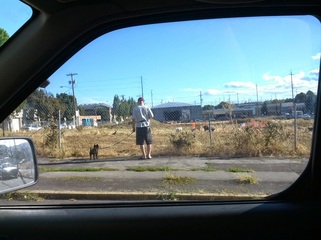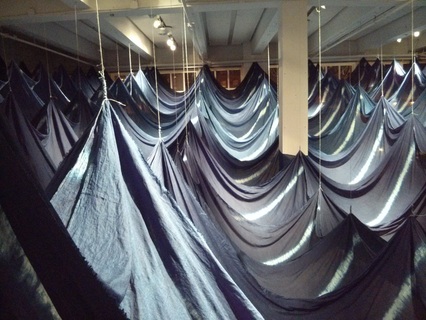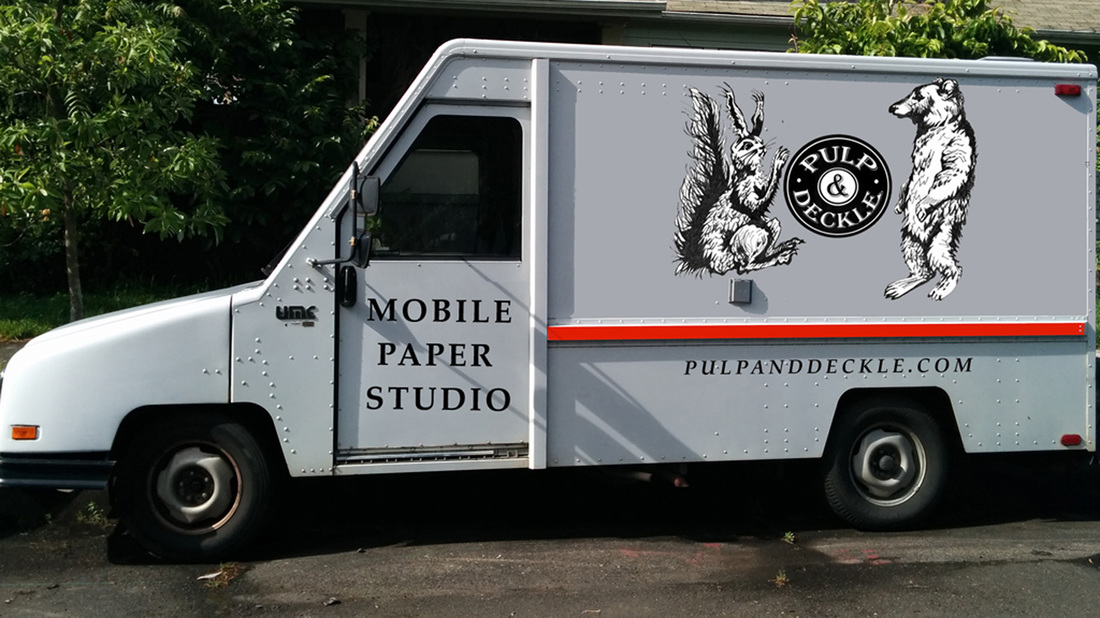 Where these goats once grazed is now a huge development called "The Goat Blocks." Where these goats once grazed is now a huge development called "The Goat Blocks." Over the past year or so we've seen snowballing change in Portland. The city is struggling with growing pains that have resulted in a housing crisis, the shuttering of iconic businesses, and the displacement of artists. Yesterday the IPRC (Independent Publishing Resource Center) announced the need to move as their rent was increased by 300%. They've launched a kickstarter campaign to raise funds for their move (we saw the announcement right as it went up and were proud to be the first backers.) This is the most recent in a growing trend of art spaces that are no longer affordable for their tenants. While we recognize the need for new construction to help ease real estate costs, we also see the need for alternative spaces to be available for creative use, such as the 7 acre eco-industrial park, Green Anchors. Doing a google search for "art spaces displacement artists Portland Oregon" it's easy to see that artists and art spaces are struggling. Here's a list of articles from the past several months;
And last year artist Carye Bye wrote a very personal account on why she could no longer stay in Portland that was published by Willamette Week. Looking at this, you might think we're feeling pessimistic about Portland's future. While it would be foolish to not be concerned, we are choosing to be optimistic. We love Portland. We choose this city, warts and all. No place is perfect, but there is so much that is good about Portland that we don't want to give up on living here. Our hope is that the new growth will shine a light on problems so that we as citizens can try to do something about them. If Portland wants to have a diverse (racially, culturally, and economically) populous we need to find ways to shape the future beyond the pull of market forces.  Rowland Ricketts: Work Time, The last exhibition on view at the Museum of Contemporary Craft Rowland Ricketts: Work Time, The last exhibition on view at the Museum of Contemporary Craft How can we do this? One way is to support the artists, orgs and small businesses that draw people to want to be here. If you don't patronize them, they will go away. Even large institutions that might seem like they could withstand tough times are not immune, as we saw with the recent closing of the Museum of Contemporary Craft. One of the major reasons cited for the closure was that the museum had been operating on a deficit for several years. While it can't be said for certain that increased attendance and donations would have saved the museum from closing, it certainly would have made it less likely. Another way is to help out when help is needed. If you can't give to a kickstarter or other fundraising effort, then share their message so it reaches people who can give. If you have more time than money consider volunteering. Go see art, dance and theater exhibitions, especially when it's free to do so. Many artists and orgs get RACC and other grants funding and high attendance reports will help ensure that the projects you want to see will get funded in the future. It may seem like the problems are too big for any of us to make a difference. That's why we have to come together. Resource sharing is something we've had the benefit of over the past several years, during our time in the c3:initiative creative business incubator. This is not a new way for artists and small businesses to survive, but it is an increasingly important one considering Portland's increasing real estate costs. A recent example of resource sharing is the XOXO Outpost, a pay-what-you-can shared workspace founded by graphic designer Andy McMillan and Andy Baio, who helped found Kickstarter. The more we can come together and pool our resources, the more we can accomplish. This brings me to our future in Portland. This fall our incubator term is ending. We've known that we would need to find a new space for the studio, and have been looking. And the conclusion was that in order for our business to grow and survive, we have to change our business model. So we are buying a food truck and turning it into a mobile paper studio. Rather than have all our money go towards paying rent on a physical space we are seeking out more partnerships with schools, businesses, artists, and creatives. The truck is small enough that we can park in most driveways, so we can pull up outside an artist's home and they could rent the studio from us for the day. Or we can drive out to a farm on Sauvie and teach a class using agricultural waste to make paper. Or we can set up in a parking lot outside a school and have a pop-up class. While the mobile model is not a good solution for everyone, it is a good solution for us. And it's becoming a more popular solution for other creative businesses and orgs too. The Portland Opera just unveiled their "Opera a la Cart" truck, a mobile performance venue that you can check out around town this summer. One of the inspirations for our mobile studio came from another notoriously expensive place for real estate, New York City. The ArtBuilt Mobile Studios are using the mobile studio as a platform for publicly engaged art making (something we strongly support!) We won't lie, we've had many a conversation circling around the idea of leaving Portland and setting up a studio on some acreage near the coast, or in the gorge. We've felt the squeeze of rising costs and increasing debt, like so many others. This is one of the primary reasons why we're crowdfunding for our mobile studio, rather than taking out a business loan. Adding to our student loans, mortgage and credit card debt, health care costs, etc. will make it even more difficult for our small business to survive. Beyond the practical financial concerns, we want to know that the community supports us and wants us to be here. Since starting our business in the fall of 2012 we've taught hundreds of students and founded an artist residency program, in addition to creating custom orders and retail goods. We've had a lot of positive feedback, and now we need our supporters to take action and help us evolve. Together we can help keep the ART in PoRTlAnd. Share and contribute to our kickstarter HERE. Thank you!!!
1 Comment
|
The StudioPulp & Deckle is a handmade papermaking studio located in Oregon. Archives
September 2023
Categories
All
|


 RSS Feed
RSS Feed